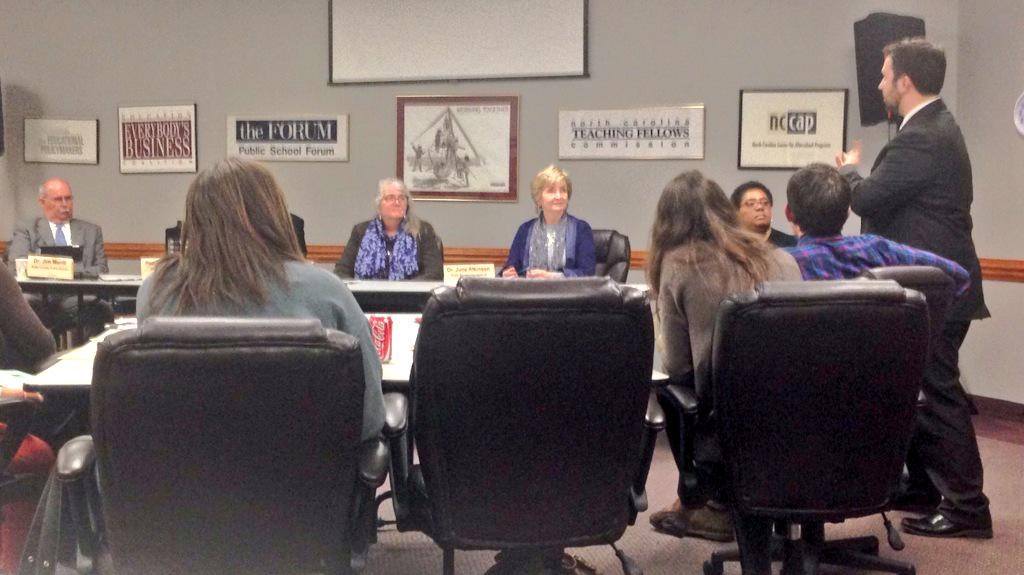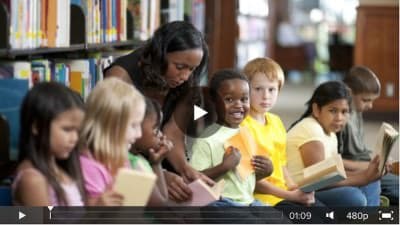
In the most transformative stage of a teacher’s career, the beginning, the motto is simply to “stay alive.” Studies show it is these years with the most teacher burnout. Is it a lack of support? Or perhaps the unbelievable expectations coupled with idealistic pedagogical training? No. It is the wrong type of support and expectations. Beginning teachers are funneled into professional development on how to manage classrooms and instructional practices to differentiate a lesson and left out of the bigger conversations shaping the future of their profession. All because of our lack of experience.
Fifty percent of teachers who enter the profession leave in their first five years. In North Carolina, 13,557 teachers left the classroom in the 2013-14 academic year: 23.18 percent were teachers in their first three years. To local and state governments, these numbers require action. As a beginning teacher, these numbers are terrifying.
Governor McCrory and the N.C. General Assembly recognize the importance of these first three years of service and have aimed to incentivize teaching as a career path for college graduates. The Governor’s proposed budget raising the base salary for beginning teachers to $35,000 is the latest attempt to recruit individuals to the profession. However, what are the efforts for retention?
Beginning teacher programs within local education agencies (LEAs) are generally aimed at the paperwork aspect of the job: ensuring professional development plans are monitored, educator effectiveness standards are accounted for, and licensure requirements are met. Mentoring programs serve as daily vent sessions and idea sounding-boards with “veteran teachers.”
However, these first three years need more than a pay incentive and instructional practice. We need a sense of empowerment.
Last summer, a group of recent graduates of N.C. State’s College of Education looking down the barrel of our first year of teaching discussed our excitement and fears starting our education careers. The conversation quickly turned to the, then new, changes to the teacher pay scale. Many wanted to be a part of the conversation to advance our understanding of the policy; however, we were dismissed and even despised by veteran teachers for “getting a raise when we hadn’t even done anything yet.” We were intimidated to even ask questions about advocacy because our lack of experience meant our opinion was invalid.
When creating lessons plans to drive student engagement, our lack of experience is seen as a hindrance, yet our expectations are often higher and more aligned with the state standards.
While in daily classroom life theoretical pedagogy only takes you 20 percent of the way, our training occurred in the middle of a shift to new standards. While our students’ standards are under fire; we, as beginning teachers, know the Common Core State Standards better than many of our more experienced colleagues and can demonstrate their effectiveness and importance to our students’ learning. However, the challenge is communicating our knowledge and determining the political obstacles given our “lack of experience.” Our understanding could have the potential to help shape the discussion around standards and policy implementation, if only it were paired with a deeper understanding of the policy and political process.
We saw this as an opportunity. A network of beginning teachers whose sole purpose was to inform education policy, what it meant for our classrooms and careers, and what steps we could take to help shape it. This network would bring like-experienced educators together and to simply do what we do best, learn in an open environment free of judgment.
It was our hope that such a program could “spark engagement with public education policy and foster professional growth, collaboration, and advocacy among a network of beginning North Carolina teachers.” After reaching out to multiple organizations and online forums, the Public School Forum of North Carolina took us on, and the Wake County pilot program for the Beginning Teacher Network began.
The network is for beginning teachers by beginning teachers.
The leadership of the program is a collection of first-year teachers from various grades and content areas who choose what topics would be of interest to our colleagues. The Public School Forum then crafted a schedule of key players to help our group better understand the political climate of our profession.
The program has two aspects. The first is monthly face-to-face meetings where the beginning teachers meet and discuss a wide range of topics (teacher pay, curriculum and standards, assessment, etc.) with educational policy leaders. The second is a virtual network where participants share their ideas from the sessions and continue their professional learning through social media.
Our latest meeting hosted a panel of public school champions for an aptly titled session, “Conversations with Educational Policy Makers” on March 19. Dr. Mary Kay Delaney, Head of Meredith College’s Department of Education; Dr. Jim Merrill, Superintendent of Wake County Public Schools; Dr. June Atkinson, State Superintendent of N.C. Public Education; and General Assembly Rep. Rick Glazier all discussed a wealth of issues with the group of beginning teachers. Topics ranged from the purpose and future of balanced assessment on the state and county level to the gaps in university training and year-one of a teacher’s career.
The network was unafraid to ask questions and share experiences of recent policy changes and the impact experienced in our classrooms: Read to Achieve rules on test administrations, Case 21 assessments, the future of teacher assistants in elementary classrooms, and the commission tasked with reviewing of the Common Core State Standards were all topics broached in this session. The major take-away, and common thread, was the impact our voices as teachers, and specifically new ones to the profession, have on the ongoing developments to improve education.
Each session shapes our understanding of how education policy impacts our classrooms. By the end of this year’s program, it is the hope of our panel of policy leaders that the BTN will develop an action plan highlighting what we’ve learned and would like to see put into effect to help transform and advance education in Wake County.
These types of opportunities give beginning teachers a chance to learn, ask questions to develop an informed opinion, then act and share on them with leaders in North Carolina public education.
Being three sessions into this pilot program, it is evident the program is the missing piece for beginning teachers. It gives us so-called inexperienced educators buy-in to our profession and makes us even greater stakeholders in the success of our schools and champions for North Carolina public education. And once in, we’re in.
Being further connected to the conversations around policy affecting our students and our careers, empowers us to propel real change, which is near impossible to walk away from.
The Beginning Teacher Network of Wake County is an opportunity to model a successful pilot program helping to develop and empower beginning teachers in their classroom and in their profession.





